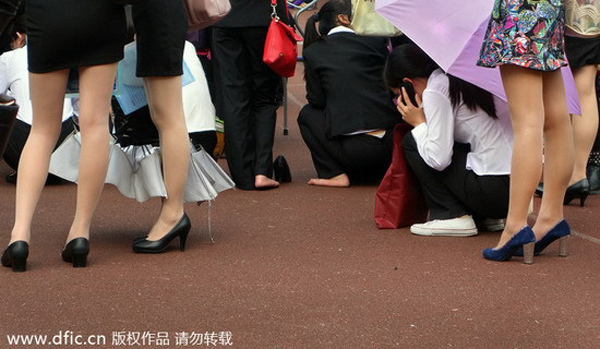Odd reasons for rejecting a job seeker
(chinadaily.com.cn) Updated: 2014-11-28 17:33
 |
|
Chinese college graduates wait outside a job fair in Guangzhou, South China's Guangdong province, on Dec 8, 2013.[Photo/IC] |
Employment discrimination, though prohibited by law, is commonly encountered by Chinese job seekers. The Employment Promotion Law, passed in 2007, stipulates no discrimination on the basis of nationality, race, sex and religion. In practice, however, the reasons behind the rejection of an employer vary greatly. Here are some odd cases of rejection by biased employers.
Salary depends on schools
At a job fair held in Sun Yat-sen University, South China's Guangdong province in November, a recruiter ranked graduates into five categories, from prestigious universities like Tsinghua, Peking Universities to common ones, with salaries ranging from 10,000 yuan ($ 1,628) to 5,000 yuan.
Good-looks earn higher salary
A shopping mall in Dongguan, South China's Guangdong province started to offer different monthly salaries to its cleaners in 2014, with 1,800 yuan given to young and good-looking staff and 1,650 yuan to others for the same workload.
Gender discrimination
A female graduate, Guo Jing, applied for a clerical post in Dongfang Cooking Training School, in Hangzhou, East China's Zhejiang province, but was turned down three times in late June, because the school "only wants male employees". Guo took the school to the court, claiming it violated her right to equal employment. In November, the court ruled in her favor and ordered the company to pay her 2,000 yuan in compensation.
Those with no romantic experience need not apply
In 2013, a marketing planning company suggested graduates look elsewhere if they have never had a romantic relationship at a job fair held in Xiamen University, East China's Fujian province. In the same year, a finance major, surnamed Huang, lost an internship opportunity for the same reason at a surveillance equipment selling company in Hangzhou in 2013.
Regional protectionism
Jiang Yaping, a native of East China's Anhui province, failed to apply for a tele consultant post in a government organ in Nanjing, East China's Jiangsu province, due to her lack of local permanent residence. After 15 months of appealing for rights, she was paid 11,000 yuan in compensation in August.
Fired for "ominous" family name
Pei Hong was fired seven times within seven months for her "ominous" family name when she worked in Changchun, Northeast China's Jilin province in 2005. Her family name "裴" sounds the same as another Chinese character "赔", which means to lose money. One of Pei's boss explained why he dismissed the woman , saying, "Every businessman wants good luck."
Wrong constellation
In 2013, a graduate, surnamed Wen, from Hangzhou Normal University in Zhejiang province, was told to give up her application to become a designer in an advertising design company, just because the company disliked Virgos and Scorpios.
Chinese zodiac sign superstition
A student, surnamed Jiang, at Hangzhou Dianzi University did not get a part-time job in a local bakery in 2013. He was rejected by the owner, who believed that their zodiac signs were in conflict with each other. In the Chinese lunar calendar, years are grouped into a 12-year cycle, with each year assigned an animal symbol: rat, ox, tiger, rabbit, dragon, snake, horse, sheep, monkey, rooster, dog and pig. Chinese traditionally hold the superstition that people's personalities reflect their zodiac animal's nature.
Related news
Adapt to changes in job market
Chinese woman wins sexual-discrimination case
- Govt encourages people to work 4.5 days a week
- Action to be taken as HIV cases among students rise
- Debate grows over reproductive rights
- Country's first bishop ordained in 3 years
- China builds Tibetan Buddhism academy in Chengdu
- Authorities require reporting of HIV infections at schools
- Typhoon Soudelor kills 14 in East China
- Police crack down on overseas gambling site
- Debate over death penalty for child traffickers goes on
- Beijing to tighten mail security for war anniversary







